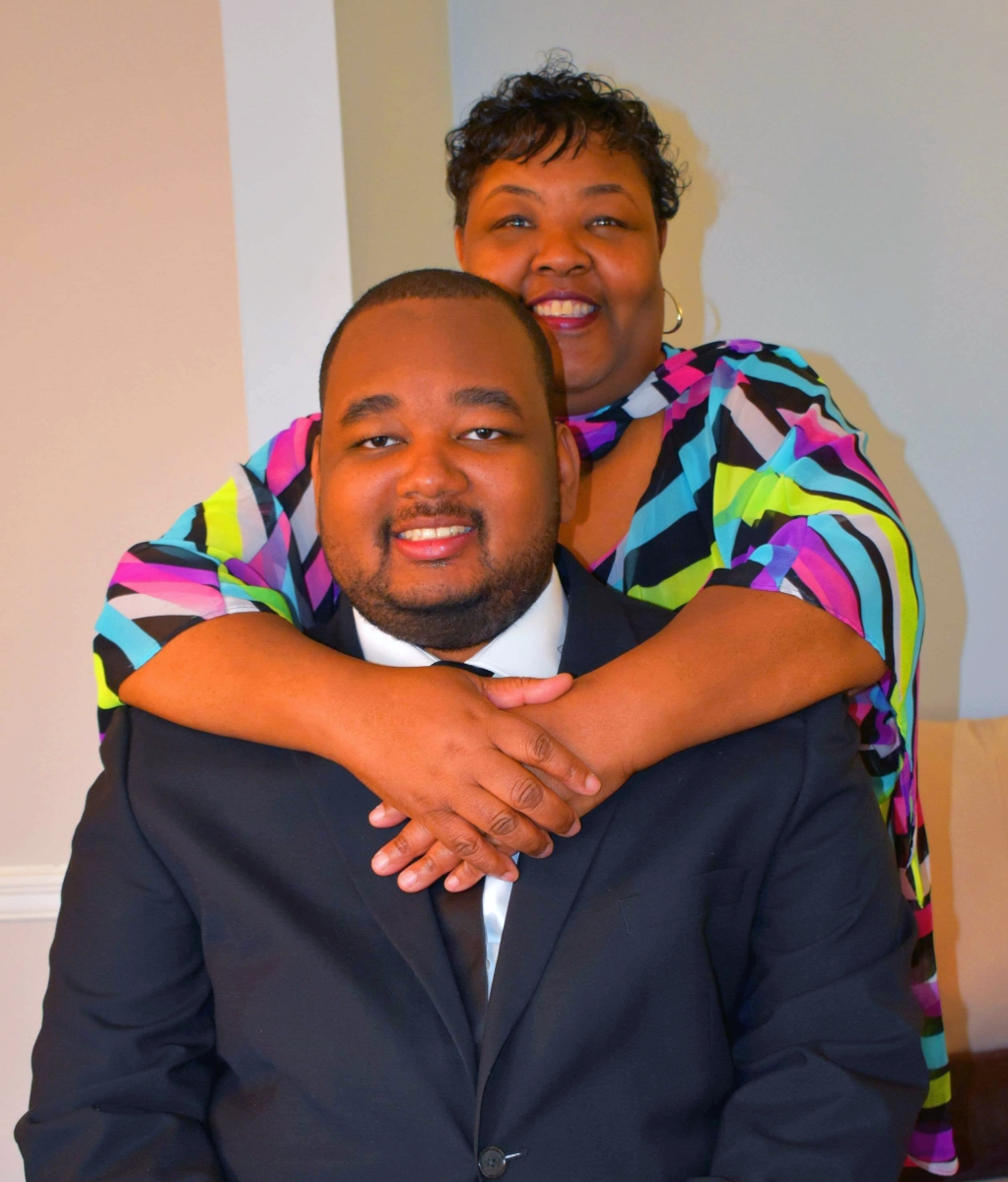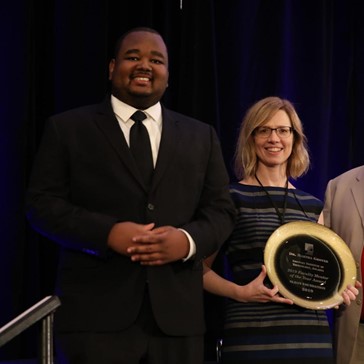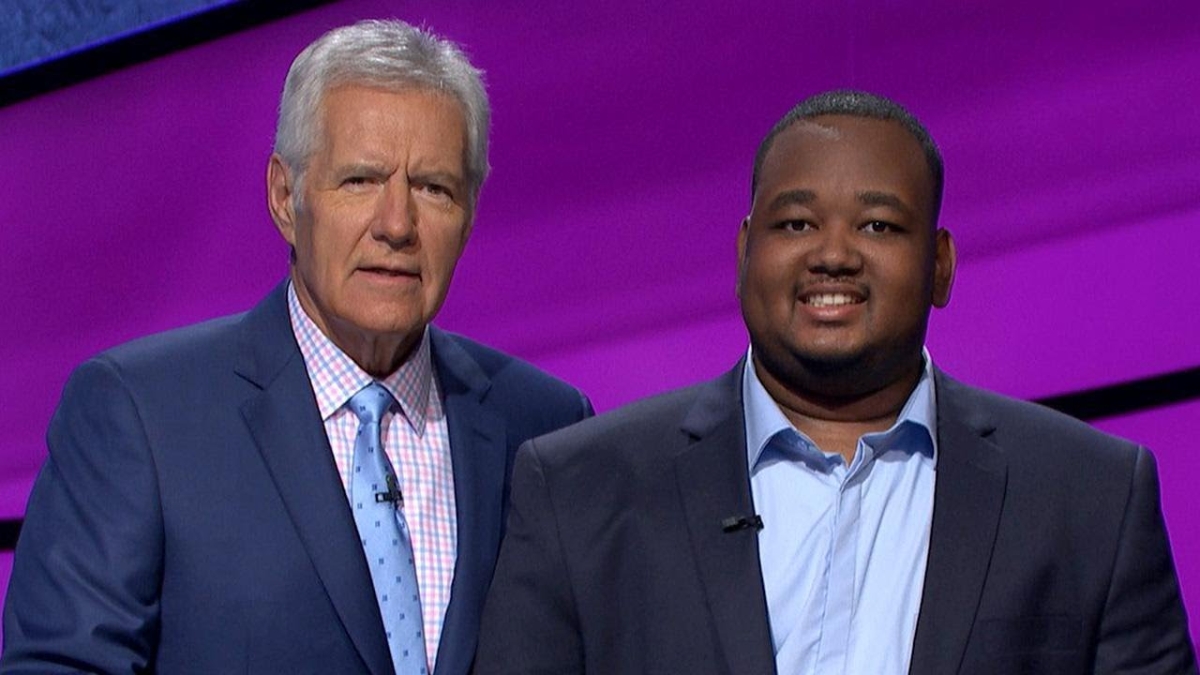
Kelvin Smith and his mother, LaRita Smith
A native of Birmingham, Alabama, Kelvin Smith was correctly diagnosed with Asperger’s syndrome, an autism spectrum disorder, at age 10, after earlier diagnoses of PDD-NOS (pervasive developmental disorder-not otherwise specified) age 4 and LD (learning disability) at age 6.
His mother, LaRita Smith (a social worker), told him, “Son, we will not let this diagnosis beat us.” She became his chief advocate, dedicating herself to supporting her son in every way she could think of, from reading books and attending workshops/support groups to exploring resources for social skills therapy.
“My mindset was total acceptance of the way Kelvin perceives the world and his challenges with social skills and reading social cues,” she said. “The key to success is transparency and using a strength-based approach to everything in his life. He is winning!”
Her commitment to her son’s development helped him throughout this educational journey from pre-school to completing his PhD in Georgia Tech’s School of Chemical and Biomolecular Engineering in June 2022 for his thesis: “Thermodynamic and Kinetic Investigation of Depsipeptide Oligomerization and Degradation under Prebiotic Earth Conditions.”
Now 29 years old, he will officially graduate in December 2022. Along the way, Kelvin was a contestant on “Jeopardy” in August 2017. He didn’t win but said he felt honored to spread a message of hope on national television to families that have children on the autism spectrum.
After completing his PhD degree, Kelvin began working as a rotational data scientist for Oracle in a remote role from Birmingham, where he lives with his mother. The two have partnered in a venture called KLSpeaks LLC, which offers autism academic coaching services to students of all ages, inspirational guest speaking, and parent consultation services.
In this Q&A, Kelvin discusses his experiences as a student, teacher, data scientist, and “Jeopardy” contestant.
How did you become interested in STEM (Science, Technology, Engineering, and Math) as a child?
I was able to find passion at the age of 2 by learning how to recite the 12 timetables correctly. My grandad was into creating inventions, and he made a device for me that allowed me to learn numbers, colors, shapes, and letters, and my mom bought me books and educational games and put me in science fairs.
Starting in middle school, I participated in Quiz Bowl competitions, which proved to be good preparation for passing my audition for “Jeopardy.”
What challenges did you face during your PhD studies?
When I started the PhD program, I struggled initially to find an advisor initially to work with and was worried about accommodations I would need as a graduate researcher.
I benefited from a supportive environment when I joined Professor Martha Grover’s research group and transitioned into a computational role after finding that I felt uncomfortable in a laboratory setting because of motor skill challenges. Having great advisors, including Drs. Grover and Charles Liotta, was key for me getting through the PhD experience.
My transparency, self-advocacy, and open communication with my advisors and the Office of Disability Services helped me tremendously. A plan was devised for me to receive strong advising and organizational support, structured deadlines, counseling, encouragement to engage with my research group, and scheduled meetings to monitor progress and understanding.

Kelvin Smith and his advisor, Professor Martha Grover
How did you choose your career path?
Because of my interest in teaching, at one point I considered entering academia but decided to transition to data science because of my love of math, statistics, probabilities, and machine learning.
I’m now employed at Oracle as a rotational data scientist where I will work with four different data science teams (research and development, client analytics, delivery strategy, and custom analytics). After the rotations are completed, I will choose the data science team that best fits my skills and interests for the long term.
I’m able to utilize transferrable skills from research and teaching in my PhD studies, focusing on my strengths including meticulous attention to detail, problem solving skills, pattern recognition, ability to work in teams, and good presentation skills. These gifts help me interact with service teams to identify meaningful insights from large data sources.
How do you help people through your business KLSpeaks LLC?
We are a mother-and-son team providing an inspirational and educational platform including academic coaching, autism parent support, and autism inspirational speaking. We empower, educate, elevate, and inspire individuals and families on the autism spectrum to imagine possibilities beyond what they see, embrace differences, and WIN!
We decided to share our journey in hopes of changing lives and providing services and resources that provide transformation to families on the spectrum. You can learn more at www.klspeaks.com.
How did your interest in teaching evolve?
My passion for teaching began to develop in elementary, middle, and high school. I continued offering academic support/tutoring during my undergraduate studies in chemical engineering at Auburn University and my PhD studies.
I honed my skills through experiences in the Alabama Power Academic Excellence Program, Alabama Alliance for Students with Disabilities in STEM, the Tutoring and Academic Support unit at Georgia Tech, the Tech to Teaching Program, and working as a teaching assistant.
I was named Teaching Assistant of the Year (2018-2019) and a two-time Shell ChBE Outstanding TA award winner (2017-2018, 2018-2019). I was pleased to be acknowledged by my peers and students who stated that I was enthusiastic about the subject matter and very helpful during office hours.
I believe in the notion that students do well when they study to learn, not study to pass. In other words, do not think about the grades. If you master and learn the material, the grades will follow. I like to incorporate humor from time to time to loosen a potentially stiff classroom environment.
How does Asperger’s Syndrome influence your teaching style?
My anxiety issues from Asperger’s Syndrome are nonexistent when I teach because I am in my element, and I’m confident in the material I present.
How I learn as an individual living with autism directly impacts my teaching style. I make complex theories simple to understand. I break down material in a step-by-step process because this is how I learn effectively. I speak, write, draw, simplify, and engage.
We all have our own superpowers on the spectrum, and I unlock that hyper-focused gift in students and relate it to the lesson. I customize academic coaching sessions to meet the needs of the student. I provide instruction that is logical, systematic, and clear. I enjoy making the complex simple and seeing the lightbulbs go off in the heads of students.
What was it like being a contestant on “Jeopardy” in 2017?
When I got the call that I made the show, I didn’t think it was real at first. Then when I went in and saw the actual set and host Alex Trebek, it was amazing. I was right on the “Jeopardy” stage with buzzer in hand. Then came my interview about awareness and acceptance of autism.
After filming the episode, a mother in the studio audience asked if her son could take a picture with me. The mother began crying because her son is autistic and she was so full of emotion, seeing how excited her son was at the show and how he looked up to me as a role model.
Being a contestant on “Jeopardy” was on my bucket list, and after 10 years of test taking and interviews, I made it.

Kelvin Smith and late Jeopardy host Alex Trebek
What activities do you enjoy in your spare time?
I live a simple life and enjoy reading almanacs and textbooks; playing video games, bridge, trivia; and watching game shows.
What else would you like people to know about life on the autism spectrum?
It’s time we increase our awareness and acceptance around individuals and families on the autism spectrum. In 2021, the CDC reported that approximately one in 44 children in the U.S. is diagnosed with an autism spectrum disorder.
Every child and adult on the spectrum are blessed with gifts. Remove the ribbon, take the paper off, open the box, and find the treasure inside. Find the gift and focus on it and be a good support system to your loved ones.
Brad Dixon, braddixon@gatech.edu